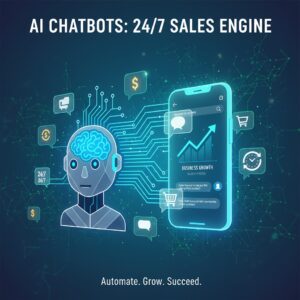
You need to understand something right now. Your competitors are already using AI chatbots to capture leads while you sleep. They are closing sales at 2 AM on a Tuesday. They are answering customer questions instantly while your phone goes to voicemail.
I have implemented chatbot systems for dozens of small businesses over the past three years. The results are consistent. Revenue goes up. Customer complaints go down. Your team focuses on high value tasks instead of answering the same questions repeatedly.
Let me show you exactly how to build a custom chatbot that actually drives sales.
Why Generic Chatbots Fail Your Business
Most business owners make the same mistake. They install a basic chatbot template and wonder why it does not generate results.
Your customers can tell immediately when they are talking to a generic bot. The conversations feel robotic. The responses miss the mark. Potential buyers leave your site frustrated.
I watched a client lose thousands in potential sales because their chatbot could not handle basic product questions. The bot kept redirecting people to a FAQ page. Customers wanted answers. They got links instead.
Here is what separates custom chatbots from template solutions:
Custom chatbots understand your specific products and services. They know your pricing structure. They can explain the difference between your premium and standard offerings. They speak in your brand voice.
Generic bots give surface level responses. They cannot handle nuanced questions. They frustrate customers more than they help.
You need a chatbot trained on your actual business data. This means feeding it your product descriptions, common customer questions, pricing information, and sales processes.
The investment pays for itself quickly. One of my retail clients saw a 34% increase in qualified leads within the first month of deploying their custom chatbot. Another service based business reduced their response time from 4 hours to 30 seconds.
Building Your Custom Sales Chatbot
The technical process is simpler than you think. You do not need a computer science degree. You need a clear strategy and the right tools.
Start by documenting your sales process. Write down every question customers ask before they buy. Map out the typical path from initial interest to closed sale.
I recommend creating a spreadsheet with three columns. Column one lists customer questions. Column two contains your ideal responses. Column three notes what action the chatbot should take next.
This becomes your chatbot training data. The more specific you are, the better your bot performs.
Next, choose your platform. I have worked with several AI chatbot builders designed for small businesses. Look for platforms that allow custom training, integrate with your existing tools, and provide analytics.
Your chatbot needs to connect with your calendar, CRM, and payment systems. Seamless integration means the bot can actually complete transactions, not just talk about them.
Train your bot using real customer conversations. Pull data from your email inbox, support tickets, and sales calls. The language customers actually use matters more than corporate speak.
Test relentlessly. Have your team try to break the bot. Ask unusual questions. See where it struggles. Refine the responses.
One mistake I see repeatedly is launching too early. Spend two weeks in testing mode. Let friends and family interact with your bot. Fix the gaps before real customers encounter them.
Your chatbot should have clear escalation paths. Some situations require human intervention. Make it easy for the bot to transfer to your team when needed.
Set up monitoring from day one. Track which questions get asked most frequently. Note where customers drop off. Review conversations weekly and update your bot training accordingly.
Maximizing Revenue With Smart Chatbot Strategy
Your chatbot is not just a customer service tool. It is a sales engine that never sleeps.
Program your bot to identify buying signals. When someone asks about pricing or availability, that customer is close to purchase. Your bot should move them toward checkout immediately.
I helped a consulting firm add a single feature to their chatbot. When prospects asked about pricing, the bot offered to schedule a discovery call right then. Booking rates increased 67%.
Use your chatbot to handle objections proactively. If price is a common concern, train your bot to explain value before customers even ask. If shipping time matters, lead with delivery speed in product descriptions.
Your bot should collect information strategically. Do not ask for an email address in the first message. Build rapport first. Provide value. Then request contact details in exchange for something useful like a quote or consultation.
Consider these proven strategies:
Offer product recommendations based on customer responses. Ask a few qualifying questions and suggest the best fit. This mimics what your best salesperson does naturally.
Create urgency without being pushy. Mention limited inventory or upcoming price changes when relevant. Your bot can check real time stock levels and communicate accurately.
Follow up automatically. If someone abandons a conversation midway, have your bot send a gentle reminder via email or SMS. I have seen this recover 20% of dropped leads.
Upsell intelligently. After someone shows interest in a product, your bot can mention complementary items or premium versions. Keep it relevant.
Your chatbot gives you data you never had before. You can see exactly which questions come up most often. You learn what stops people from buying. You identify gaps in your website content.
Use this intelligence to improve everything. If ten people ask the same question about return policies, your policy might be unclear. Fix the root problem.
The businesses winning with chatbots treat them as team members. They train them regularly. They measure performance. They optimize continuously.
Your chatbot will not replace your sales team. It will make them more effective by handling routine questions and qualifying leads automatically.
Start today. Document ten common customer questions. Write clear answers. Find a platform and build a simple version. Launch it on one page of your website.
Monitor results for two weeks. Adjust based on real conversations. Expand gradually.
The businesses that move fast with AI will dominate their markets. The ones that wait will spend years catching up.
Your 24/7 sales team is ready to work. You just need to build it.
Please check our Business Tips https://thoughts.business/category/business-tips/
Please check our partner site – Why Invest? https://whyinvest.info/





